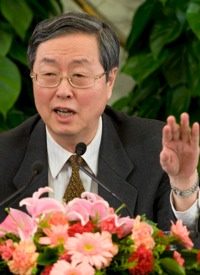
China is calling for a new global reserve currency to replace the dollar. According to an AP report, the governor of China’s central bank, Zhou Xiaochuan, wrote in an essay on Monday that the dollar should be replaced by a currency composed of a basket of participating currencies.
The suggestion, echoing the recommendations issued by a UN panel last week, and likely to be supported in some form by Russia and other non-Western members of the G-20 in coming weeks, is no doubt motivated in part by a desire to protect China’s vast holdings of U.S. dollars. China, the largest holder of U.S. government debt, has expressed unease in recent weeks that the United States, rather than honor its obligations, may instead opt to debase the value of the dollar by printing money to redeem its own Treasuries. Such concerns were likely not allayed by the Fed’s most recent move, the purchase of more than $1 trillion in debt, including $300 billion in long-term Treasury bonds.
Beyond purely financial concerns about the dollar’s future viability, the notion of a single world reserve currency — which dates back to the original Bretton Woods conference in 1944 when the IMF and World Bank were first set up — are not likely to go away. The U.S. dollar, pegged until 1971 to gold, emerged from Bretton Woods as the de facto world currency, but the crisis roiling the world’s financial markets has persuaded many in global financial circles that the time — or perhaps the opportunity — has come to revisit the issue.
In practical terms, going from the present state of affairs, in which many nations, and not only in the West, hold enormous dollar reserves, to a hypothetical global currency replacing those dollar holdings, would be a daunting task (although much the same was said of the euro, before its successful launch).
A single world currency emanating from a world central bank has long been an important unrealized plank in the international socialist program. With the economic and moentary authority of the U.S. foundering worldwide, many internationalists are eager for a chance to subordinate the dollar and U.S. financial activity to global supervision. The Chinese one-world currency proposal is not the first of its kind, and is not likely to be the last.



